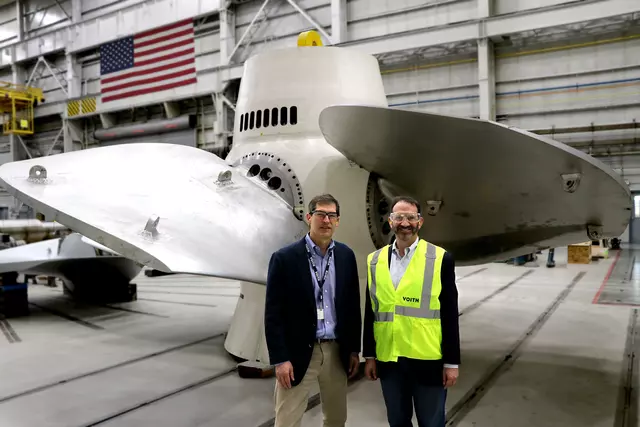HydroSchool workshop - Success comes from sharing information and exploring fresh ideas
Many businesses and organizations place a high value on continuing education and ongoing professional development. The London School of Business & Finance notes that continuous professional development benefits both the employee and the organization and allows them to keep pace with their industry’s current standards; improve service for customers; and push productivity higher. Further, when the opportunity for ongoing education is available for workers, it improves employee retention and is a draw for job candidates.
These are just some of the reasons why Voith Hydro developed its HydroSchool program. Launched in 2014, Voith offers this series of technical trainings to hydropower workers worldwide. Covering hydropower related topics, Voith HydroSchool aims to bridge the gap between technology and industry experience. Through this program, Voith brings subject matter experts into both physical and virtual classrooms to help customers, partners, prospects and students expand their knowledge base on the industry’s most important topics.
Anyone who keeps learning stays young
One successful HydroSchool event took place in York, Pennsylvania by Voith Hydro North America. It brought hydropower customers from across North America together with Voith Hydro experts worldwide to learn, exchange ideas and network.
“We organized the Voith Hydro Training Workshop in York, Pennsylvania to explore the challenges and opportunities currently happening in the hydropower industry,” explained Inna Kremza, Principal Engineer, Customer Training Manager, Voith Hydro North America. “We wanted to give attendees a chance to learn about and discuss the latest trends in efficiency, modernization and digitalization because these concepts are really driving decisions in hydroelectric facilities around North America.”
Insights from an industry leader
Malcolm Woolf, President and CEO of the National Hydropower Association inspired and excited attendees as the keynote speaker of the event.
“At the time of planning, Malcolm Woolf had just been named to lead the NHA,” said Stanley Kocon, President & CEO of Voith Hydro North America. “He was someone that people wanted to hear from. They wanted to know his views on the industry’s trajectory and what his organization was doing to promote and protect hydropower in Washington, D.C. From our point of view, Malcolm was the perfect pick for our event.”

Advocating for hydropower
In his keynote address, Woolf urged the more than 70 attending professionals to personally promote hydropower and raise awareness of its value as it competes against other, less-mature and often, less reliable forms of renewable energy production.
“Hydropower continues to work as the foundation of our electrical grid, yet it gets very little support in regard to taxes and grants,” Woolf said when comparing it to solar and wind. “Because we are an older, more mature industry, we don’t get the credit we deserve for doing our job so well.”
Woolf recommended that hydropower facilities around the country invite their local leaders and U.S. congressional delegations on site tours every few years to keep hydropower in mind as they legislate future policy.
The takeaway of the speech was to empower the HydroSchool attendees to promote the benefits of their operations locally. With their help, Woolf explained, the efforts of the NHA are amplified in Washington and the U.S. state capitals, and the value of hydropower is better understood.
Sessions with power

Twelve training sessions were offered to attendees throughout the three-day workshop, and each was selected to provide a high-value learning opportunity.
“As a training event, our goal was to educate hydropower owners and operators on the most up-to-date technology available to them,” said Kremza. “Through numerous case studies and trend reports, we used the workshop to share the experiences and findings we’ve collected with the support of our customers.”
Sessions included generator design; maintenance; modernization and rehabilitation; turbine design; digital solutions for hydropower; controls and network segmentation; safety by design; governor, exciter and protection for hydro plants; and case studies from Voith’s extensive service experiences. Throughout the workshop, networking opportunities were also abundant, allowing attendees to interact with one another as well as the two dozen or so experts from Voith who attended. Also available was an augmented reality (AR) demonstration, which showed how hydropower operators can use the latest digital technology to assist them with maintenance and regular operations.
Hydropower factory tours
The HydroSchool event didn’t just stick to classroom training – there were opportunities for attendees to see Voith in action at our North American headquarters in York, Pennsylvania, and then tour a nearby hydropower plant.
“The tours of our headquarters included two key locations – our manufacturing floor and our Hydraulic Test Lab, which is the only one in North America operated by a hydropower manufacturer. This was something that people were really interested in,” said John Seifarth, SVP & COO, Voith Hydro North America. “Our goal for visitors was to let them get a glimpse behind the scenes and allow them to recognize that these sites are completely dedicated to their needs.”

Hydropower technology in action
Further, a special tour was coordinated at the Muddy Run Pumped Storage Facility in Drumore Township, Pennsylvania. The Muddy Run tour came about through the generosity of Exelon, which made their site available as an added benefit to workshop attendees. The tour showcased the site requirements and unique features of a pumped storage station, which, at the time of its creation in 1968, was the largest pumped storage facility in the world.
“Though it’s now decades old, Muddy Run continues to provide tremendous value to our region by providing long duration energy storage,” said Carl Atkinson, Director of Business Development, Voith Hydro U.S. “It also allowed visitors to see Voith’s pump turbine equipment in action and learn more about how Exelon operates this important hydropower facility. A walk through the plant and some short discussions to see and hear about how others operate and maintain hydropower facilities stimulate ideas to investigate and implement at your own facility and how to improve your operations. In the end, the Muddy Run tour was a very popular part of the workshop.”
Atkinson also noted the secondary value of the Voith and Muddy Run walk-throughs: “The tours helped set the workshop apart from other training sessions. Getting people out of a classroom setting was a goal. Our visitors got to see real-life projects underway in our shop and the technology used at Muddy Run. That helped make this workshop a success.”
A quality experience for attendees
Looking back, all involved consider the Voith Hydro Training Workshop a success, and preliminary plans are under way to continue the HydroSchool tradition and conduct further training workshops that offer even more to hydropower professionals across the North America region.
“This was intentionally a broad experience for our visitors,” said Atkinson. “We wanted participants to walk away with a vision for their facility and how its performance and reliability could improve if it were equipped with the latest hydropower technologies.”
Attendees agreed. After each session, they were asked to offer anonymous assessments. Here is just a sampling of those responses:
The value of HydroSchool

Voith is dedicated to the ongoing training of hydropower employees around the globe. Learning new skills and new technologies is especially vital for this sector of the energy industry because hydropower is a very mature industry. That maturity means that digitalization is increasingly important to facilities that have been in operation for decades, because updating them with modern technology delivers more efficiencies.
There’s also another trend at play to drive home the need for HydroSchool: The rise of small hydro. With this technology, areas where hydropower would have been impossible a few years ago are now ideal locations thanks to innovations in small hydro.
“These factors have led to a need for targeted training for hydropower workers. There are those who need to know how to integrate what’s new into their existing systems, and there are those who need to be trained from the ground up,” Kremza said. “Through HydroSchool we can help them learn that. We can show them how to get the most out of their facility.”
Remote learning brings even more value
To deliver a high value to customers and prospects, Voith will continue to hosts events like the North America workshop, but it is also increasingly turning to virtual training events where hydropower workers can attend as part of their daily activities, rather than traveling to a formal workshop.
“We are pushing for HydroSchool to be even more flexible than it was before,” Kremza said. “We want to help our customers be more competitive, and learning industry-tested best practices from the subject matter experts at HydroSchool is one of their best opportunities to grow professionally.”
Driven to the next level
Although the Voith Training Workshop is over, Stanley Kocon, Voith Hydro North America President & CEO, sees it as a perfect stepping stone to future efforts from HydroSchool and its efforts to boost the impact of hydropower.
“With the workshop, we discussed and demonstrated our leading edge technologies as well as our modern training and educational capabilities designed to provide the industry with valuable experiences and information,” Kocon said. “Hydropower is a critical and strategic element of the North American electricity infrastructure, and efforts to improve its capabilities only make it that much more valuable. That’s our goal at Voith – to drive hydropower in North America and globally to the next level – and events like the Voith Hydro Workshop do just that.”

